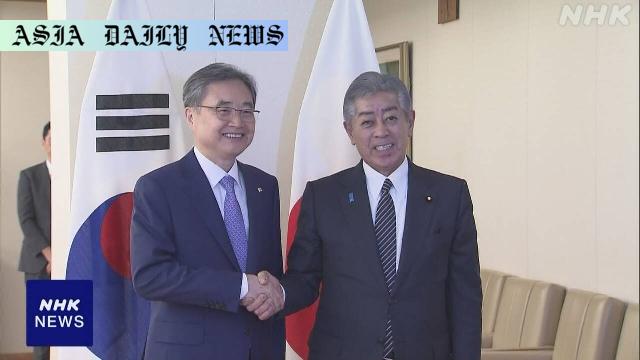Bilateral Ties: Japanese and South Korean ministers aim to foster development in strategic relations amidst global challenges.
- Key Point 1: Japanese Foreign Minister expressed optimism about strengthening bilateral ties with South Korea.
- Key Point 2: Both leaders agreed on close collaboration regarding North Korea and Indo-Pacific issues.
- Key Point 3: Talks focused on fostering trilateral relations among Japan, South Korea, and the US.

Introduction: Context of Japan-South Korea Diplomatic Engagement
The relationship between Japan and South Korea has often been shaped by history, geopolitics, and common strategic challenges. The recent in-person meeting between Japanese Foreign Minister Iwaya Takeshi and his South Korean counterpart Cho Hyun marks a critical step in recalibrating and enhancing these ties. As global dynamics shift and new challenges emerge, the necessity for cooperation has grown exponentially. This report delves into the recent meeting, its implications for the future, and what it signifies for the bilateral relations of these two influential Asian nations.
Strengthening Strategic Partnership in a Complex Global Landscape
During their Tokyo meeting, Foreign Ministers Iwaya Takeshi and Cho Hyun emphasized the importance of strengthening their nations’ ties in light of the evolving strategic global landscape. The ministers recognized that collaboration between Japan and South Korea benefits not only their nations but also contributes positively to regional stability. Both representatives acknowledged the shared responsibility of addressing North Korea’s nuclear and missile threats, as well as its abduction of foreign nationals. The ministers underscored their commitment to protecting regional peace, emphasizing the significance of bilateral and trilateral efforts, particularly involving the United States.
Indo-Pacific Cooperation: A Shared Vision
A critical aspect of the discussions was the Indo-Pacific region, a geopolitical hotbed of opportunity and challenges. The Japanese and South Korean ministers stressed the importance of cooperative strategies to safeguard the region’s security and stability. This shared vision aligns with both countries’ broader commitments to international law, safe trade routes, and mutual economic prosperity. Minister Iwaya highlighted how essential it is for their governments to maintain consistent communication, especially given the growing complexity of global challenges.
Significance of Trilateral Relations with the United States
Another prominent theme addressed during the meeting was the trilateral relationship involving Japan, South Korea, and the United States. All three countries share a vested interest in peace and security, particularly in the face of unsanctioned weapons development and geopolitical instability. By reiterating their partnership, both Japan and South Korea have signaled their intent to pursue synchronized policies that promote collective defense and proactive diplomatic engagement. This trilateral approach enhances their capability to respond swiftly to emerging threats.
Diplomatic Optimism amid Historical Challenges
Despite historical grievances that have occasionally strained relations, the meeting also reflects a commitment to look forward and deepen collaboration. The leadership of South Korean President Lee Jae-myung seems focused on repairing and strengthening relationships with international allies. Minister Cho’s emphasis on dialogue and practical solutions underscores Seoul’s pragmatic approach toward maintaining and advancing peaceful ties. For Japan, Minister Iwaya’s remarks highlight Tokyo’s recognition of the importance of smooth diplomatic coordination during turbulent times.
Looking Ahead: Opportunities for Cooperation
While specific details of the Tokyo meeting remain undisclosed, the signals from both sides indicate a renewed focus on fostering trust and collaboration. The path forward involves navigating sensitive issues that have historically hampered the relationship while simultaneously capitalizing on shared interests, such as tackling climate change, enhancing technological innovation, and optimizing regional trade mechanisms. The success of such efforts hinges on ongoing dialogue and adherence to shared values of mutual respect and cooperation.



Commentary
Rediscovering the Value of Bilateral Cooperation
In today’s interconnected world, the meeting between Japan and South Korea’s foreign ministers is a timely reminder of the importance of diplomatic engagement. Both nations, sharing deep cultural ties and common strategic interests, have a great deal to gain from closer collaboration. This is particularly important when considering the shared challenges they face—ranging from North Korean provocations to broader regional security concerns in the Indo-Pacific. Strengthening their partnership will not only enhance their own security but will also contribute to global peace and stability.
The Role of Historical Reconciliation
However, bilateral relations between Japan and South Korea have often been marred by unresolved historical grievances. While economic and strategic imperatives drive their cooperation, underlying tensions over history can resurface, jeopardizing progress. Both sides must acknowledge that building trust takes consistent effort and transparency. A commitment to open dialogue, guided by mutual respect, will serve as the foundation for a more resilient and enduring partnership in the years to come.
A Message to the Global Community
The meeting also sends an important message to the international community: diplomatic efforts must endure, even in challenging times. Japan and South Korea are setting an example of how nations with divergent pasts can find common ground for the greater good. Their renewed focus on trilateral relations with the United States reinforces the philosophy that collective action is always stronger than individual pursuits. By working together, Japan and South Korea are not only securing a brighter future for their citizens but are also contributing to a more stable and prosperous world order.